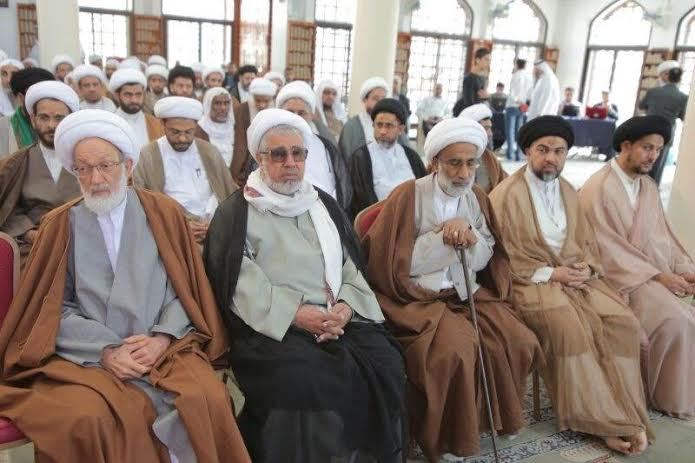(AhlulBayt News Agency) - The Government of Bahrain has continued to target Shia religious leaders, as authorities brought an additional charge of “inciting hatred” against Sayed Majeed Misha’al, a Shia cleric and president of the now dissolved Islamic Ulamaa Council (IUC). On 20 June 2016, Sayed Majeed declared the start of a peaceful sit-in at the village of Diraz to protest of the government’s decision to denaturalize Ayatollah Sheikh Isa Qassim, the spiritual leader of Bahrain’s Shia population. Sayed Majeed and Sheikh Isa are among at least 56 Shia religious figures and clerics subjected to judicial harassment by Bahraini authorities in the last three months. The undersigned NGO strongly condemn the government’s ongoing persecution of the Bahraini Shia community and call on it to halt all legal proceedings against Shia religious leaders such as Sayed Majeed Misha’al and Sheikh Isa Qassim.
In addition to revoking Sheikh Isa’s citizenship, the Public Prosecution charged Sheikh Isa and two others with alleged money laundering in July. The charges relate solely to the Shia religious practice of khums, an annual payment made by Shia Muslims to Shia clerics for distribution to those in need. The government, however, claims that the charges are not linked to religious practices, alleging instead that Sheikh Isa and other clerics have illegally received foreign funding and have been “withdrawing, depositing, purchasing, allocating, and distributing the amounts in a way that shows that their sources are licit, contrary to the facts/reality.” Critics of the case suggest that the government is creating an opportunity to both target Shia religious leadership and centralize its authority over the khums practice in order to generate profit.
“Khums is a religious obligation for all Shia and is used to assist the community’s most vulnerable, including orphans,” says human rights defender, religious freedoms campaigner, and religious scholar Sheikh Maytham al-Salman. “In the Shia community, khums represents a collective effort to assist those who are less fortunate. It seeks to eliminate poverty and build harmony within society.”
Sheikh Maytham has also recently been the target of Bahraini authorities. On Monday, the government released Sheikh Maytham from custody after charging him with illegal gathering for participating in the peaceful demonstrations in Duraz. He remains under a travel ban. The sit-in continues in Duraz despite the government’s attempts to limit participation by issuing official statements threatening the protesters, blocking entry to the village, restricting internet access, and frequently summoning and arresting those involved.
“The demonstration in Duraz represents the continued commitment of the Bahraini people to peaceful protest and human rights,” stated Husain Abdulla, Americans for Democracy & Human Rights in Bahrain Executive Director, “This commitment stands in stark juxtaposition to the Bahraini government’s ongoing violations of free expression, assembly, and association, illustrating the government’s complete unwillingness to reform.”
In response to this recent campaign of intimidation and detention, five United Nations Special Procedures issued a joint statement calling for an end to the “persecution” of Bahrain’s Shia community, noting: “Shias are clearly being targeted on the basis of their religion.”
Bahraini authorities have intensified their targeting of Shia religious leaders to the extent that clerics have suspended Friday prayers for fear of retribution. On 16 June 2016, a number of clerics stated that the “suppression of the Bahraini Shia Muslims had reached its highest level ever, and members of the kingdom’s largest religious community feel insecure and face threats of arrest and prosecution if they seek to observe their religious rituals, primarily congregational prayers and Friday prayers.” Further, Bahraini authorities have physically prevented a number of Shia clerics from reaching their mosques in order to lead prayer gatherings.
“The charges against Shia religious figures and clerics are clear attacks on the right to freedom of religion in Bahrain,” said Sayed Ahmed Alwadaei, Director of Advocacy at Bahrain Institute for Rights & Democracy. “This summer of intimidation and discrimination by the Bahraini government is unprecedented, it further marginalizes the entire Bahraini Shia community, and it must be met with strong international condemnation from Bahrain’s allies such as the US and Britain.”
We, the undersigned NGOs, condemn the campaign of repression initiated by the authorities since June. We call on the Government of Bahrain to:
- Immediately and unconditionally release all Shia clerics and religious figures detained on charges related to free expression, assembly, association, and/or religious belief;
- Halt all forms of discrimination against the Bahraini Shia community;
- Reinstate the citizenship of Ayatollah Sheikh Isa Qassim and all others who have been targeted with denaturalization for their activism; and
- Cease attacks on peaceful protests and allow peaceful assembly and expression to take place without reprisal.
Signed,
Americans for Democracy & Human Rights in Bahrain
Bahrain Center for Human Rights
Bahrain Institute for Rights and Democracy
European Centre for Democracy and Human Rights
/129

